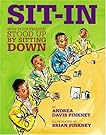 Spiritual Parenting: An Awakening for Today’s Families by Michelle Anthony
Spiritual Parenting: An Awakening for Today’s Families by Michelle Anthony
My rating: 4 of 5 stars
Spiritual Parenting by Michelle Anthony stands out amongst the crowd of Christian books by grounding parenting in discipleship. Instead of focusing parental energy on sin management, Anthony urges parents to share their lives transformed by the gospel. “The goal of spiritual parenting is that our children would learn to hear and know God’s voice, desire to obey it, and obey it in the power of God’s Spirit, not their own strength.â€
With a goal of passing down a vibrant faith, Anthony describes environments and values that we should consciously cultivate in parenting: storytelling, identity, faith community, service, out of the comfort zone, responsibility, course correction, love and respect, knowing, and modeling. I found each chapter encouraging. Though Anthony is not coming from a covenantal perspective, I found her ideas and examples compelling and easy to comport to a reformed theology of children.
As twenty-first century evangelicals reconsider how to do church, the way we raise children in the faith must be part of that conversation. Anthony’s book is a good start for parents to consider some of the fundamental concerns of raising children who share an authentic and transformational faith. It also serves as a necessary reminder that parents are responsible for the spiritual formation of their children, and how they live is much more important to that development than anything that happens for an hour or two a week.
It is a temptation for parents to look for someone to tell them just what to do, and this book is not structured to feed that. Anthony encourages parents to know their children, embrace the way God made them, and parent them as individuals. Without a formula to follow, parents are better reminded of their eternal focus. “What is our job then? The joy of parenting can be spent on cultivating environments for our children’s faith to grow, teaching them how to cultivate a love relationship with Jesus as we cultivate our own, living our lives authentically in front of them so that they become eyewitnesses to our own transformation. “ (8.5/10) [I received a copy of this book from the publisher for review purposes.]
view the book trailer | buy the book from amazon.com






